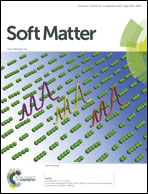Interface deformations affect the orientation transition of magnetic ellipsoidal particles adsorbed at fluid–fluid interfaces
Abstract
Manufacturing new soft materials with specific optical, mechanical and magnetic properties is a significant challenge. Assembling and manipulating colloidal particles at fluid interfaces is a promising way to make such materials. We use lattice-Boltzmann simulations to investigate the response of magnetic ellipsoidal particles adsorbed at liquid–liquid interfaces to external magnetic fields. We provide further evidence for the first-order orientation phase transition predicted by Bresme and Faraudo [Journal of Physics: Condensed Matter, 2007, 19, 375110]. We show that capillary interface deformations around the ellipsoidal particle significantly affect the tilt-angle of the particle for a given dipole-field strength, altering the properties of the orientation transition. We propose scaling laws governing this transition, and suggest how to use these deformations to facilitate particle assembly at fluid–fluid interfaces.


 Please wait while we load your content...
Please wait while we load your content...